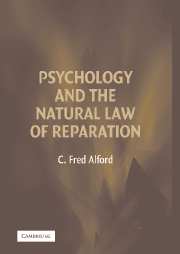1 - Antigone and the Natural Law
Published online by Cambridge University Press: 24 July 2009
Summary
My approach to the natural law is inspired by an article by Henry Veatch, “Natural Law: Dead or Alive?” originally published in 1978. After a brief but encyclopedic review of the natural law since Saint Thomas Aquinas, whom he interprets in good Aristotelian fashion, Veatch concludes that even today those who talk about rights remain dependent on a natural law they do not acknowledge. Consider Alan Gewirth's Reason and Morality (1978), which argues that human agents must recognize that their actions are both purposive, as well as voluntary and free. Furthermore, to recognize this is to recognize that this state of affairs is good. But, to acknowledge that this is true for me is also to acknowledge that it must be good for any and every other human being.
Veatch (2005) asks why is this the only rational response? Why could someone not respond roughly as follows? Sure, I'm glad that I am in a position to act freely and purposefully as a human being. But, I don't claim freedom and purpose as a right, since it is nothing more than a simple fact about my individual situation, albeit a very happy fact. Thus, there is no way in which I am logically bound to recognize a corresponding right to freedom and purpose on the part of other human beings. In other words, Kantian universalism does not avoid the appeal to natural law, no matter what clothes it wears, and that includes the celebrated attire of John Rawls (1999).
- Type
- Chapter
- Information
- Psychology and the Natural Law of Reparation , pp. 1 - 22Publisher: Cambridge University PressPrint publication year: 2006

